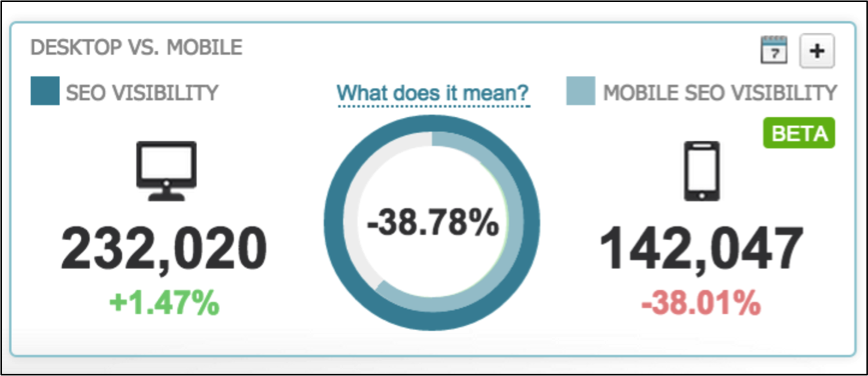By Stacey MacNaught
It’s been six days since the rollout of Google’s mobile algorithm update, dubbed “mobilegeddon”, began.
It’s been a long time coming, but it was unusual in the way that Google announced the specific date we could expect the rollout way back in February. National news outlets including Sky and the BBC also covered the change, leading many to expect near-apocalyptic shifts in the SERPs.
After a very quiet first day, it started to look like it might all have been a bit more talk than action from Google.
But after analysing data updated by SearchMetrics, it appears the UK has its first big brand victim in-retailer next.co.uk. The headline figures from SearchMetrics show that next.co.uk has dropped a whopping 38% of its organic visibility on mobile search in the past week:
Next.co.uk’s mobile offering
A number of us have been asking the question for years – when will next.co.uk get a mobile site?
Go to next.co.uk on your mobile and you’ll suffer a pretty painful pinch and zoom experience when simply trying to browse, let alone buy anything.
Needless to say, the site fails Google’s own “mobile friendly“ test.
It performs poorly on Google’s Mobile User Experience Recommendations tool too.
Unsurprisingly, the site hasn’t earned a mobile friendly badge from Google.
But there IS a mobile site!
This is where it gets odd. A manual check for m.next.co.uk reveals there IS a mobile website:
However, the site hasn’t been set up to redirect mobile users automatically and, at the time of writing, brand searches on mobile still show the main, non-mobile website:
The site appears to have existed since March 2014, based on a Wayback Machine search for the splash page at next.co.uk/mobile, but still hasn’t been indexed by Google. This has been caused by the mobile site’s robots.txt file being set up to block all user agents.
How much visibility has Next really lost on mobile?
38% visibility loss on mobile for a site with as much visibility as next.co.uk is a big deal.
But let’s look at some specific keywords and rankings. We’ve also looked at the approximate search volume for these search terms and, importantly, the proportion of searches Google states come from a mobile device.
(Note – all rankings checked in incognito mode on Chrome.)
SearchMetrics (as of 23 April) shows significantly larger differences between mobile and desktop visibility than our manual checks show. A sample from the SearchMetrics report:
This suggests some further fluctuations (both positive and negative) for Next since 23 April.
Even with the differences highlighted from a number of our manual searches, there’s still a significant amount of traffic at stake for next.co.uk.
And with a particularly high proportion of searches around their products coming from mobiles, it’s even more important that they address their mobility issues.
Fixing it
Next has a mobile website already, but the site hasn’t been set up for indexing in Google. The retailer should:
* Set the robots.txt up to ensure Google and other search engines can crawl the site.
* Redirect users on smartphone devices to the mobile version of the website.
* Follow Google’s annotation advice outlined
Making it better
Fixing the crawling and indexing issues is the first step for Next. But simply having a mobile site isn’t enough.
Next is competing with some big names for their organic visibility including Asos, Boohoo, Debenhams and John Lewis, all of whom have mobile sites of varying speeds and quality. They’ll need to ensure they’re at least matching their competitors in terms of mobile performance.
And, most importantly, ensuring that users can browse and buy easily and efficiently on any device will be paramount to driving sales on smartphones – particularly given the phenomenal volume of smartphone specific searches in their area.
Want to know even more?
Give your content marketing another boost by getting our four free digital marketing ebooks and our weekly content marketing newsletter.
You’ll immediately receive 123 pages of expert insight straight to your inbox.
Yes! Get My Four Free Ebooks Now…







